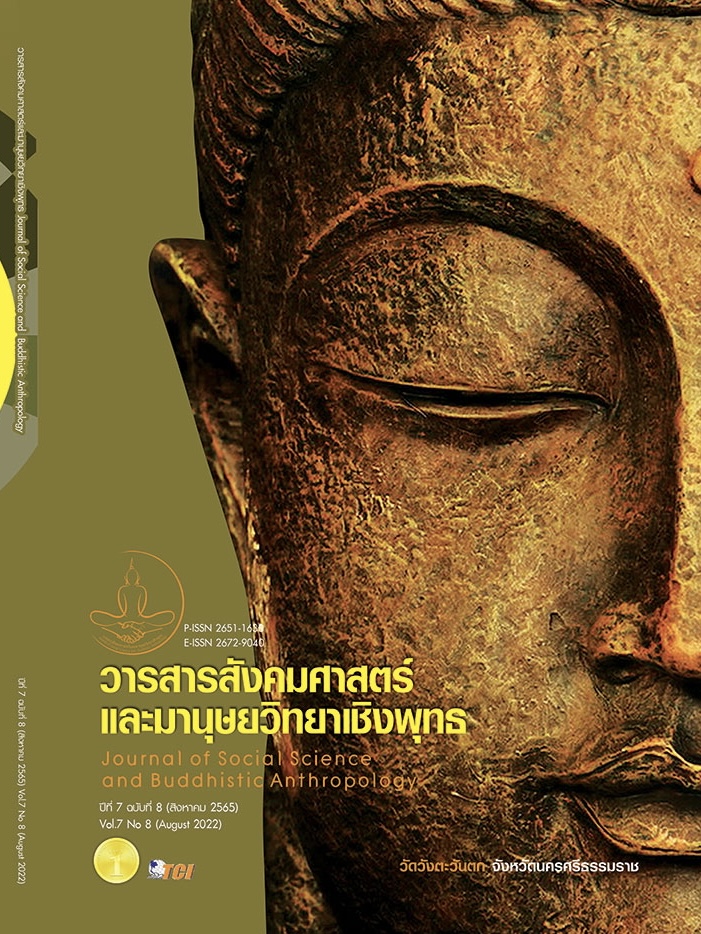THE TECHNOLOGY LEADERSHIP DEVELOPMENT MODEL FOR SCHOOL ADMINISTRATORS IN THE DIGITAL ERA UNDER KRABI PRIMARY EDUCATION SERVICE AREA OFFICE
Keywords:
The Technology Leadership, School Administrators in The Digital Era, Development of Model, Krabi Primary Education Service Area OfficeAbstract
The objectives of this research article were to 1) study current conditions and needs in the technology leadership development for school administrators in the digital era, 2) create the technology leadership development model for school administrators in the digital era, 3) Evaluate the technology leadership development model for school administrators in the digital era. It is a mixed research method. The key information providers were 136 school administrators, educational institute administrators were 5 people, 9 experts in connoisseurship, and 12 experts in focus group discussions. The tools used to collect data were 1) a questionnaire was a 5-level estimation scale, 2) an in-depth interview, 3) expert-led seminar documentation, 4) model assessment form. The statistics used in the data were content analysis, Mean, Standard Deviation, and an improved requirement value (PNI Modified). The research results indicated that; 1. The overall of current conditions were at a high level. The overall of needs at a highest level and PNI Modified = 0.14, 2. The technology leadership development model for school administrators in the digital era consists of 3 parts: Part 1, objectives and principles of the model. Part 2, the content of the model consists of 2.1) elements of technological leadership were 6 components: 2.1.1) Systematic improvement, 2.1.2) Citizenship in the digital age, 2.1.3) Innovation in learning in the digital age, 2.1.4) Excellence in professional practice, 2.1.5) Learning Teaching, 2.1.6) Leadership and Vision. 2.2) The process of technological leadership developing for school administrators in the digital age were: Goals, Infrastructure management, Digital Technology Competency Development, Applied in Educational Institutions digital age, Evaluate. 3) The quality of educational institutions. Part 3 Factors for Success. And 3. The results of the assessment of the technology leadership development model for school administrators in the digital era were accuracy at a high level and utility at the highest level.
References
กระทรวงศึกษาธิการ. (2551). หลักสูตรแกนกลางการศึกษาขั้นพื้นฐานพุทธศักราช 2551. กรุงเทพมหานคร: กระทรวงศึกษาธิการ.
กระทรวงศึกษาธิการ. (2557). แนวปฏิบัติตามประกาศกระทรวงศึกษาธิการ เรื่อง นโยบายการจัดงบประมาณ ICT (Information and Communication Technology). กรุงเทพมหานคร: บริษัท จามจุรีโปรดักส์ จำกัด.
เจษฎา ชวนะไพศาล. (2563). แนวทางการพัฒนาภาวะผู้นำเชิงเทคโนโลยีของผู้บริหารสถานศึกษากลุ่มสหวิทยาเขตทวารวดีสังกัด สำนักงานเขตพื้นที่การศึกษามัธยมศึกษาสุพรรณบุรี. ใน สารนิพน์ศึกษาศาสตรมหาบัณฑิต สาขาวิชาการบริหารการศึกษา. มหาวิทยาลัยศิลปากร.
ชนิดาภา กลีบทอง. (2564). ผลปฏิบัติงานด้านนวัตกรรมสหกิจศึกษา. พิษณุโลก: คณะวิทยาศาสตร์ มหาวิทยาลัยนเรศวร.
ไชยา ภาวะบุตร และคณะ. (2563). รูปแบบการพัฒนาภาวะผู้นำเชิงเทคโนโลยีของผู้บริหารสถานศึกษาในยุคดิจิทัล. วารสารการบริหารการศึกษาและภาวะผู้นำ มหาวิทยาลัยราชภัฏสกลนคร, 9(33), 1-11.
ณิชาวรณัฐ ซองดี. (2563). การศึกษาภาวะผู้นำของผู้บริหารสถานศึกษาในศตวรรษที่ 21 ของโรงเรียนในอำเภอวังเหนือ สังกัดสำนักงานเขตพื้นที่การศึกษาประถมศึกษาลำปาง เขต 3. ใน สารนิพนธ์การศึกษามหาบัณฑิต สาขาวิชาการบริหารการศึกษา. มหาวิทยาลัยพะเยา.
ทินกร บัวชู และทิพภาพร บัวชู. (2562). ภาวะผู้นำดิจิทัลของผู้บริหารสถานศึกษา. วารสารครุศาสตร์สาร, 13(2), 294-285.
ผ่องพรรณ พลราช. (2560). ภาวะผู้นำของผู้บริหารสถานศึกษาในศตวรรษที่ 21 สังกัดสำนักงานเขตพื้นที่การศึกษามัธยมศึกษา เขต 29. ใน วิทยานิพนธ์ครุศาสตรมหาบัณฑิต สาขาวิชาการบริหารการศึกษา. มหาวิทยาลัยราชภัฏอุบลราชธานี.
ภัทรา ธรรมวิทยา และนันทรัตน์ เจริญกุล. (2557). การศึกษาภาวะผู้นำเชิงเทคโนโลยีของผู้บริหารโรงเรียนเอกชน ระดับประถมศึกษาในเขตธนบุรี. การศึกษาภาวะผู้นำเชิงเทคโนโลยีของผู้บริหารโรงเรียนเอกชน ระดับประถมศึกษาในเขตธนบุรี, 10(1), 1-13.
วิชชุลาวัณย์ พิทักษ์ผล. (2558). การศึกษากับเทคโนโลยี. วารสารการศึกษาไทย, 12(122), 21-24.
ศิริพงษ์ กลั่นไพฑูรย์. (2564). รูปแบบการพัฒนาภาวะผู้นำทางวิชาการในยุคดิจิทัลของผู้บริหารสถานศึกษาขั้นพื้นฐาน. ใน วิทยานิพนธ์การศึกษามหาบัณฑิต สาขาวิชาการบริหารการศึกษา. มหาวิทยาลัยนเรศวร.
สำนักงานเขตพื้นที่การศึกษาประถมศึกษากระบี่. (2564). ข้อมูลสารสนเทศทางการศึกษา ปีการศึกษา 2564. กระบี่: สำนักงานเขตพื้นที่การศึกษาประถมศึกษากระบี่.
สุกัญญา แช่มช้อย. (2561). การบริหารสถานศึกษาในยุคดิจิทัล. กรุงเทพมหานคร: โรงพิมพ์แห่งจุฬาลงกรณ์มหาวิทยาลัย.
สุรีรัตน์ โตเขียว. (2560). รูปแบบภาวะผู้นำของผู้บริหารสถานศึกษาขั้นพื้นฐานในศตวรรษที่ 21. ใน ดุษฎีครุศาสตรดุษฎีบัณฑิต สาขาวิชาการบริหารการศึกษา. มหาวิทยาลัยราชภัฏนครสวรรค์.
Alan, S. D. (2004). A Study of the Technology Leadership of Texas high School Principals. Retrieved March 30, 2022, จาก http://proquest.umi.com/ pqdweb?did=765816391&sid=1&Fmt=2&clientId=47903&RQT=309&VName=PQD.
American Institute for Research (AIR). (2009). Evaluation of the school technology leadership initiative: External evaluation report 2. Washington, DC: American Institutes of Research.
Center for the Advanced Study of Technology Leadership in Education: CASTLE. (2009). Principals Technology Leadership Assessment. Retrieved October 30, 2021, from http://dangerouslyirrelevant.org/wp-content/uploads/ 2017/04/PTLAPacket.pdf.
Grey-Bowen, J. E. (2010). A Study of Technology Leadership Among Elementary Public-School Principals in Miami-Dade County. In Ph.D. dissertation, School of Information Studies, Faculty of Educational Leadership. Thomas University.
International Society for Technology in Education (ISTE). (2009). National Educational Technology Standard for Administrators. Retrieved May 15, 2019, from https://id.iste.org/docs/pdfs/20-14_ISTE_Standards-A_PDF.pdf
Krejcie, R. V. & Morgan, D. W. (1970). Determining Sample Size for Research Activities. Journal of Educational and Psychological Measurement, 30(3), 607-610.
Valdez, G. (2005). Technology Leadership: Enhancing Positive Educational Change. Retrieved March 13, 2022, from http://www.ncrel.org/ sdrs/areas/issues/ educatrs/leadership/le700.htm
Watts, C. D. (2009). Technology leadership, school climate, and technology integration: A correlation study in K-12 public schools. In Doctor of Education in the Department of Educational Leadership Thesis. University of Alabama.
Downloads
Published
How to Cite
Issue
Section
License
Copyright (c) 2022 Journal of Social Science and Buddhistic Anthropology

This work is licensed under a Creative Commons Attribution-NonCommercial-NoDerivatives 4.0 International License.









